Early Intervention for Substance Use Disorders: Definition, Goals, Benefits, Process, Treatment
Behavioral disorders are serious conditions that disrupt a person’s ability to manage emotions, behaviors, and relationships in daily life. These patterns of disruptive behavior go beyond occasional misbehavior and significantly impact social, academic, and occupational functioning. Behavioral disorders typically emerge in childhood or adolescence and, without proper intervention, continue into adulthood, affecting personal growth and quality of life.
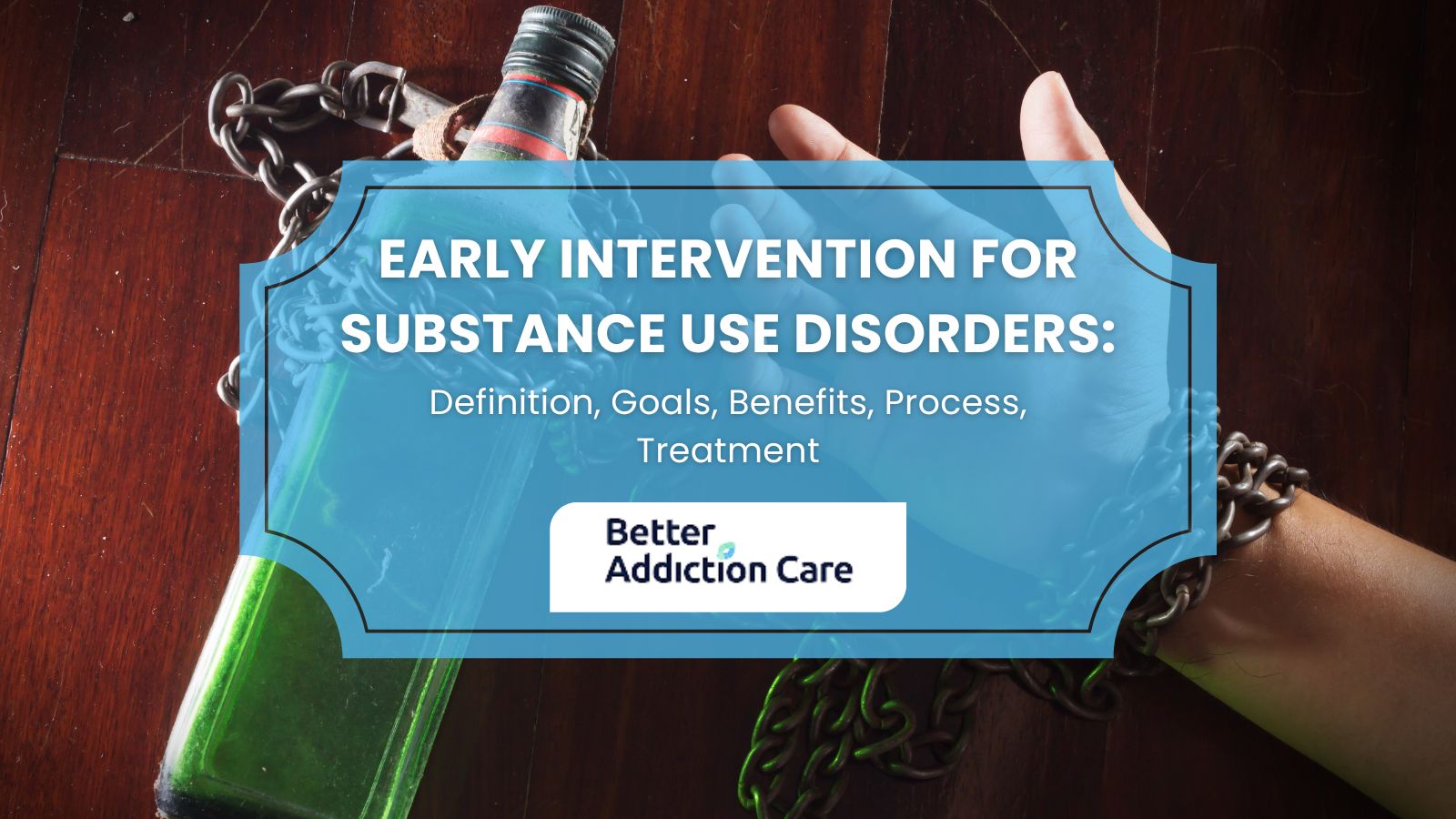
Behavioral disorders are serious conditions that disrupt a person’s ability to manage emotions, behaviors, and relationships in daily life. These patterns of disruptive behavior go beyond occasional misbehavior and significantly impact social, academic, and occupational functioning. Behavioral disorders typically emerge in childhood or adolescence and, without proper intervention, continue into adulthood, affecting personal growth and quality of life.
According to the National Institute of Mental Health (NIMH), in 2022, approximately 23.1% of U.S. adults, equating to 59.3 million individuals, experienced behavioral disorders and mental illness.
The causes of behavioral disorders are influenced by a combination of genetic, environmental, and psychological factors. Adverse childhood experiences, trauma, inconsistent parenting, brain chemistry, and family history of mental illness are among the most common contributors. These factors interact in complex ways, leading to chronic behavioral issues that require clinical attention.
There are several types of behavioral disorders, including Attention-Deficit/Hyperactivity Disorder (ADHD), Oppositional Defiant Disorder (ODD), Conduct Disorder (CD), and Disruptive Mood Dysregulation Disorder (DMDD). Each presents unique challenges but shares common traits such as impulsivity, defiance, or aggressive behavior.
Typical signs and symptoms include difficulty following rules, frequent temper outbursts, persistent disobedience, irritability, and trouble forming relationships. These behaviors are intense, prolonged, and inconsistent with age-appropriate development.
The underlying effects of these disorders vary from neurological imbalances and developmental delays to exposure to violence, neglect, or instability at home or school. These root issues contribute to how the disorder manifests and progresses over time.
Treatment for behavioral disorders involves a combination of therapy, behavioral interventions, family support, and sometimes medication. Early diagnosis and consistent treatment significantly improve the long-term outcomes for individuals affected by these disorders.
What Is a Behavioral Disorder?
A behavioral disorder is a pattern of disruptive behavior that is atypical for an individual's age and developmental level, and which significantly impair social, academic, or occupational functioning. These behaviors include aggression, defiance, hyperactivity, and difficulties in following rules or norms. According to the Diagnostic and Statistical Manual of Mental Disorders, Fifth Edition (DSM-5), behavioral disorders encompass conditions such as Attention-Deficit/Hyperactivity Disorder (ADHD), Oppositional Defiant Disorder (ODD), and Conduct Disorder (CD). These disorders are associated with disturbances in behavior, thoughts, or emotions that cause personal distress or impairment.
How Common Are Behavioral Disorders in Adults in the United States?
Behavioral disorders are very common among adults in the United States. The National Institute of Mental Health (NIMH) reports that more than one in five U.S. adults live with a mental illness, which includes behavioral disorders. According to the National Institute of Mental Health it is estimated that approximately 15.5 million U.S. adults have Attention-Deficit/Hyperactivity Disorder (ADHD), a common behavioral disorder. However, access to treatment remains a challenge, with only about one-third of diagnosed individuals receiving prescriptions for stimulants, and nearly 75% of those facing difficulties in filling these prescriptions due to medication shortages.
What Causes Behavioral Disorders?
The causes of behavioral disorders are genetics, brain chemistry, prenatal factors, trauma, neglect, environmental instability, substance exposure, and developmental conditions. These factors influence how individuals process emotions, interact with others, and respond to stress. Behavioral disorders typically result from a combination of these influences, rather than a single cause.
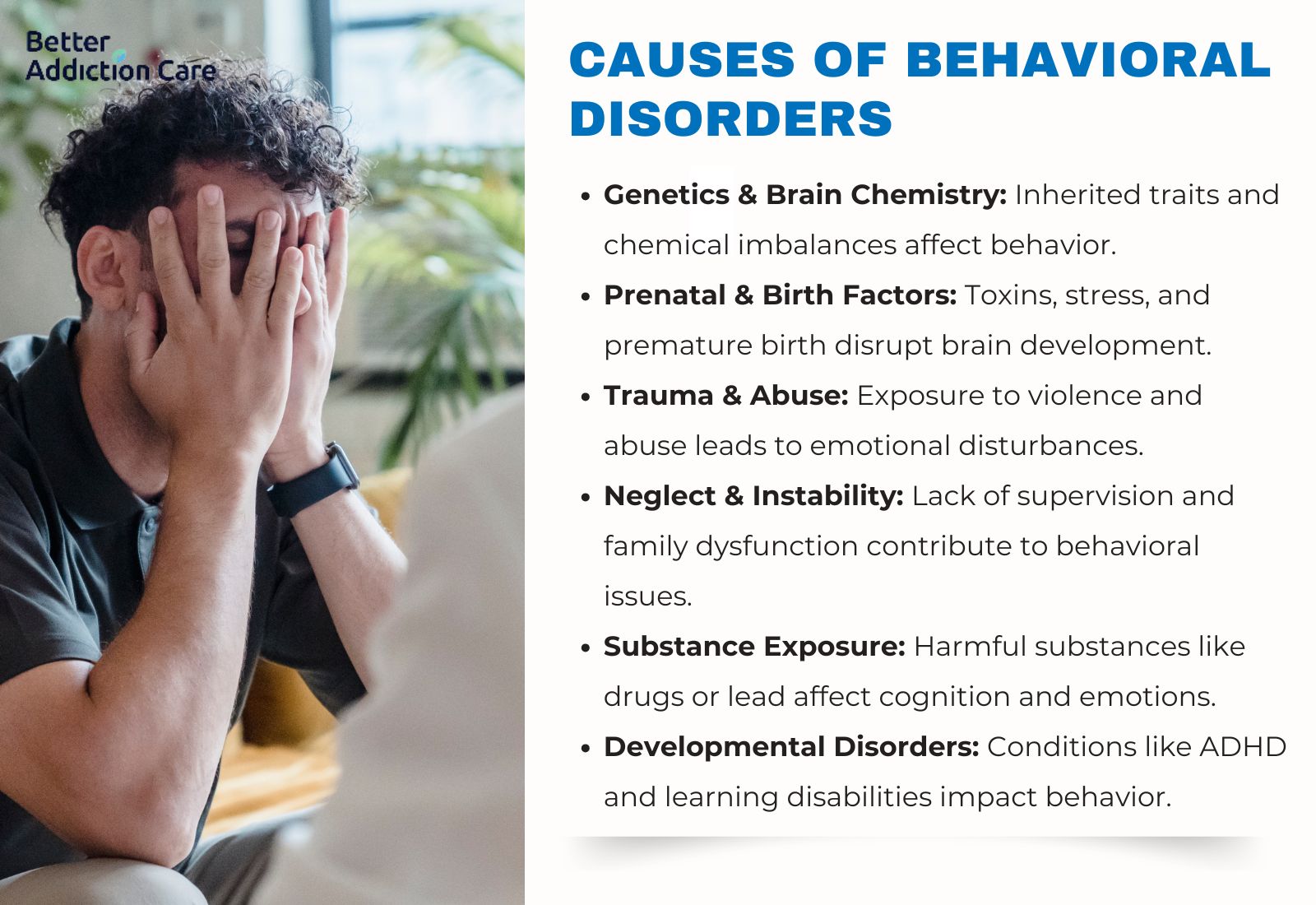
Common causes of behavioral disorders are given below:
-
Genetics and Brain Chemistry: Inherited traits and imbalances in brain chemicals influence behavior regulation and impulse control.
-
Prenatal and Birth Factors: Exposure to toxins, maternal stress, premature birth, and low birth weight contribute to early brain development disruptions.
-
Trauma and Abuse: Physical, emotional, or sexual abuse and exposure to violence lead to long-term behavioral and emotional disturbances.
-
Neglect and Unstable Home Environment: Inconsistent discipline, lack of supervision, and family dysfunction create conditions for behavioral problems to develop.
-
Substance Use and Exposure: Contact with harmful substances like lead or drugs disrupts cognitive function and emotional regulation.
-
Developmental and Learning Disorders: Conditions such as ADHD and learning disabilities affect behavior, especially when left unaddressed.
What Is the Difference Between a Behavioral Disorder and Behavioral Addiction?
The difference between a behavioral disorder and a behavioral addiction is that a behavioral disorder involves persistent disruptive behaviors that interfere with daily life, while a behavioral addiction involves compulsive engagement in a specific behavior despite negative consequences. A behavioral disorder involves patterns of disruptive, defiant, or impulsive behaviors that interfere with daily functioning and relationships. These behaviors are typically rooted in developmental, psychological, or neurological conditions and begins in childhood or adolescence. In contrast, a behavioral addiction involves compulsive engagement in a specific behavior, such as gambling, shopping, or internet use, despite harmful consequences.
While both conditions involve behavior that disrupts life and wellbeing, behavioral disorders are diagnosed based on patterns of emotional or conduct-related dysfunction, whereas behavioral addictions are driven by a cycle of craving, action, and reward similar to substance use disorders. Both require clinical intervention, but treatment approaches differ based on the underlying causes and behavioral patterns involved.
What Are the Types of Behavioral Disorders?
The types of behavioral disorders include Oppositional Defiant Disorder (ODD), Conduct Disorder (CD), Attention-Deficit/Hyperactivity Disorder (ADHD), Intermittent Explosive Disorder (IED), Disruptive Mood Dysregulation Disorder (DMDD), and various Impulse Control Disorders. These conditions are characterized by persistent patterns of disruptive behaviors that impair social, academic, or occupational functioning.
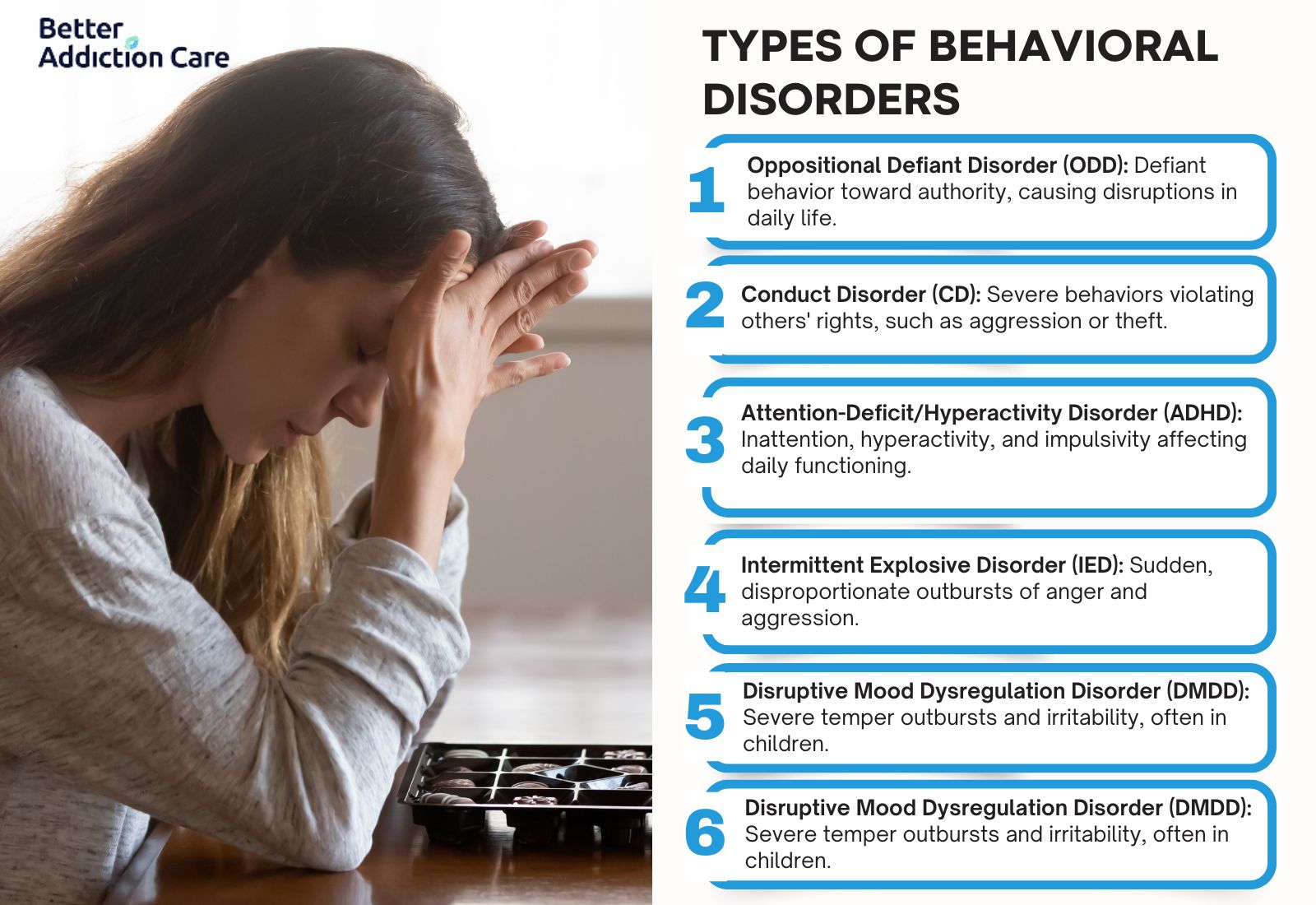
The types of behavioral disorders are defined below:
Oppositional Defiant Disorder (ODD)
Oppositional Defiant Disorder is a behavioral condition marked by a consistent pattern of uncooperative, defiant, and hostile behavior toward authority figures that interferes with daily functioning. ODD affects approximately 1% to 11% of children and adolescents in the general population, with an average prevalence of 3.3% according to Medscape, "Oppositional Defiant Disorder: Background, Etiology, Epidemiology" in 2024. Common symptoms include frequent temper tantrums, excessive arguing with adults, active defiance, deliberately annoying others, and blaming others for one's mistakes.
Conduct Disorder (CD)
Conduct Disorder is a more severe behavioral disorder characterized by repetitive patterns of behavior that violate the rights of others or societal norms. This includes aggression toward people or animals, destruction of property, deceitfulness or theft, and serious violations of rules. According to the Cleveland Clinic, about 30% of children with ODD develop a more serious behavior condition called conduct disorder. According to the National Comorbidity Survey Replication (NCS-R), the lifetime prevalence of ODD is approximately 8.5%.
Attention-Deficit/Hyperactivity Disorder (ADHD)
ADHD is a neurodevelopmental disorder characterized by patterns of inattention, hyperactivity, and impulsivity that interfere with functioning or development. In 2025, an estimated 404 million adults globally have ADHD, reflecting a 2% annual increase in diagnoses since 2020 according to Jill Johnson Coaching, "Adult ADHD: The Latest & Greatest Stats for 2025". Key symptoms include difficulty sustaining attention, frequent careless mistakes, fidgeting, inability to remain seated, excessive talking, and interrupting others.
Intermittent Explosive Disorder (IED)
Intermittent Explosive Disorder involves sudden episodes of unwarranted anger, to the point of rage, that are disproportionate to the situation at hand. The lifetime prevalence of IED in the United States ranges from 4% to 7.3%, with approximately 16 million Americans affected according to the National Institute of Mental Health (NIMH), "Intermittent Explosive Disorder Affects up to 16 Million Americans" in 2006. Individuals with IED experience verbal outbursts, physical aggression, property damage, and assaults on others during these episodes.
Disruptive Mood Dysregulation Disorder (DMDD)
DMDD is a childhood condition characterized by severe and recurrent temper outbursts that are grossly out of proportion in intensity or duration to the situation. The prevalence of DMDD in children and adolescents is approximately 1%, according to studies applying the full diagnostic criteria according to Hogrefe, "Prevalence Rate and Course of Symptoms of Disruptive Mood Dysregulation Disorder" in 2017. Symptoms include frequent temper outbursts (three or more times per week) and a persistently irritable or angry mood between outbursts.
Impulse Control Disorders
Impulse Control Disorders encompass conditions where individuals fail to resist the urge to perform acts that could be harmful to themselves or others. This category includes disorders such as kleptomania (compulsive stealing), pyromania (compulsive fire-setting), and compulsive sexual behavior disorder. Prevalence rates vary among these disorders, but they are generally considered rare. Symptoms involve an increasing sense of tension before committing the act and a sense of relief or gratification upon completion.
What Are the Effects of Behavioral Disorders?
The effects of behavioral disorders are academic struggles, self-esteem issues, social isolation, chronic stress, and reduced quality of life. Behavioral disorders have far-reaching effects that impact a person's emotional development, relationships, academic or job performance, and overall quality of life. Left untreated, these disorders contribute to long-term difficulties in social integration, impulse control, and emotional regulation. The effects begin in childhood and persist into adulthood, affecting nearly every aspect of daily functioning.
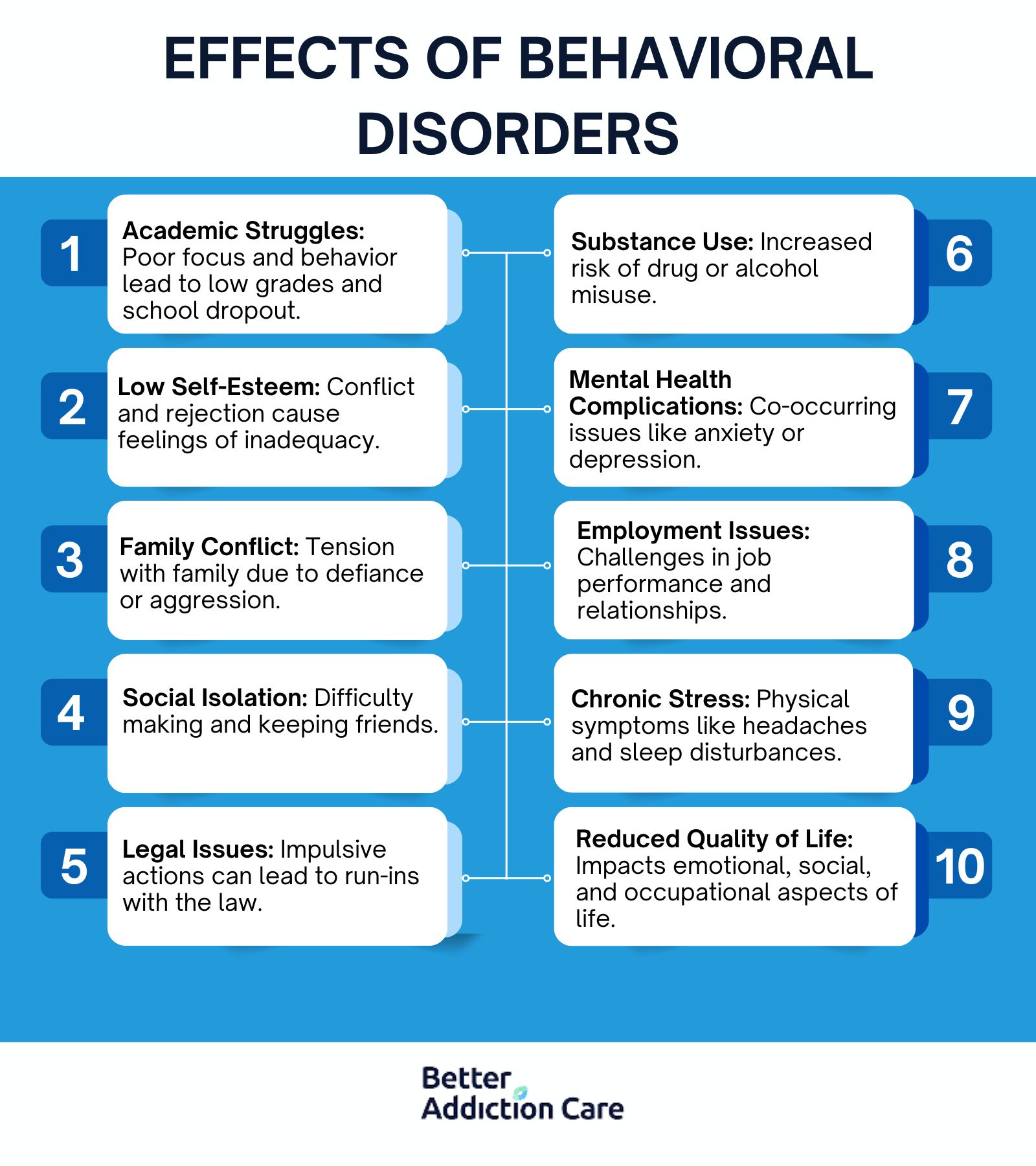
Common effects of behavioral disorders are given below:
-
Academic struggles: Poor concentration, disruptive behavior, and incomplete assignments result in low grades and school dropout. According to a meta-analysis by Reid et al. (2004) published in Exceptional Children, between 33% and 81% of children with emotional and behavioral disorders (EBD) experience academic difficulties, indicating a strong correlation between behavioral issues and underachievement in school.
-
Low self-esteem: Frequent conflict and social rejection lead to feelings of inadequacy and self-doubt.
-
Family conflict: Strained relationships with parents and siblings due to defiance, aggression, or withdrawal.
-
Social isolation: Difficulty forming and maintaining friendships due to inappropriate or aggressive behavior.
-
Legal issues: Risk-taking and impulsive actions, especially in conduct-related disorders, lead to encounters with law enforcement.
-
Substance use: Increased vulnerability to drug or alcohol misuse as a coping mechanism. The National Institute on Drug Abuse in 2020 reports that about half of those who experience a mental illness during their lives will also experience a substance use disorder and vice versa, highlighting the significant overlap between behavioral health issues and substance misuse.
-
Mental health complications: Co-occurring disorders such as anxiety, depression, or mood disorders are common.
-
Difficulty maintaining employment: Behavioral challenges interfere with job performance, punctuality, and workplace relationships. The World Health Organization reported in 2022 that globally, an estimated 12 billion working days are lost every year to depression and anxiety, costing approximately US$1 trillion annually in lost productivity.
-
Chronic stress: Prolonged emotional and behavioral challenges contribute to physical symptoms like headaches or sleep disturbances.
-
Reduced quality of life: Overall impairment in emotional, social, and occupational areas of life.
What Are the Signs and Symptoms of Behavioral Disorders?
The symptoms of behavioral disorders are persistent patterns of disruptive, impulsive, or socially inappropriate behaviors that interfere with daily functioning at home, school, work, or in social settings. These symptoms are more intense and prolonged than typical developmental behaviors and create conflict with authority figures, peers, or family members.
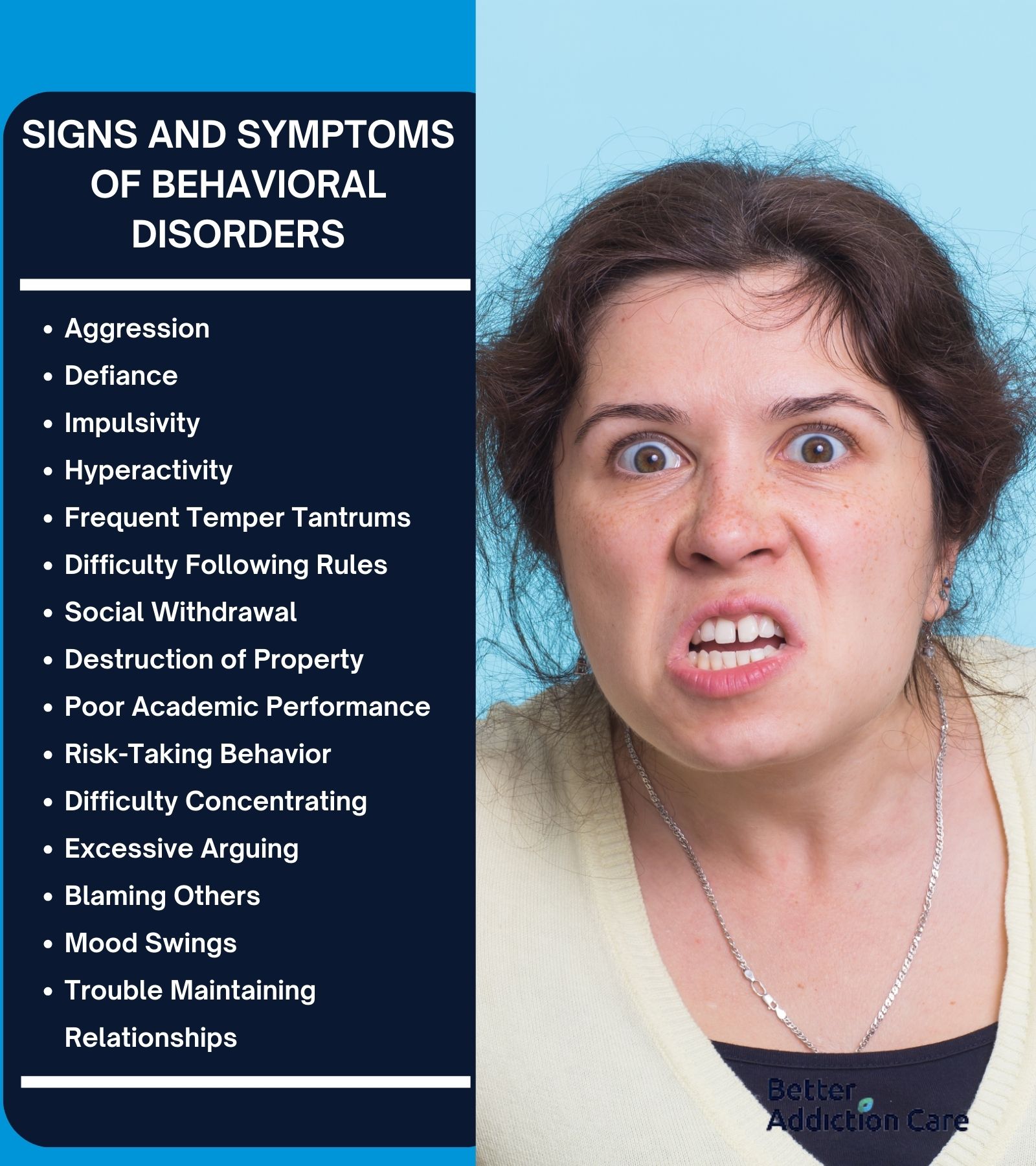
Common symptoms of behavioral disorders are given below:
-
Aggression: Physical or verbal hostility, common in Conduct Disorder (CD), Intermittent Explosive Disorder (IED), and Oppositional Defiant Disorder (ODD).
-
Defiance: Persistent refusal to follow rules or respect authority, frequently seen in ODD and CD.
-
Impulsivity: Acting without thinking, presents in Attention-Deficit/Hyperactivity Disorder (ADHD) and Impulse Control Disorders. A meta-analysis of 175 studies worldwide estimated the prevalence of ADHD in children aged 18 and under at 7.2% according to Children and Adults with Attention-Deficit/Hyperactivity Disorder.
-
Hyperactivity: Excessive movement and restlessness, a core feature of ADHD.
-
Frequent temper tantrums: Intense emotional outbursts, common in Disruptive Mood Dysregulation Disorder (DMDD) and ODD.
-
Difficulty following rules: Consistent resistance to structure, typical in ODD and CD.
-
Social withdrawal: Avoidance of social interaction, sometimes observed in DMDD and severe forms of ODD.
-
Destruction of property: Intentional damage to objects or surroundings, a hallmark of CD and sometimes seen in Impulse Control Disorders.
-
Poor academic performance: Declining grades and classroom issues, frequently associated with ADHD and CD.
-
Risk-taking behavior: Engaging in unsafe or reckless activities, common in ADHD and Conduct Disorder.
-
Difficulty concentrating: Struggles with focus, especially in ADHD.
-
Excessive arguing: Frequent confrontations, typically seen in ODD.
-
Blaming others: Refusal to accept responsibility, present in ODD.
-
Mood swings: Rapid shifts in emotion, characteristic of DMDD and IED.
-
Trouble maintaining relationships: Conflict with peers or authority, common across ODD, CD, and ADHD.
What Are the Treatments for Behavioral Disorders?
The treatments for behavioral disorders are inpatient care, partial hospitalization, intensive outpatient programs, medications, behavioral therapies, and support groups. These treatments focus on managing disruptive symptoms, improving emotional regulation, and promoting healthier social functioning. A combination of medical, psychological, and social interventions is the most effective approach for long-term improvement.
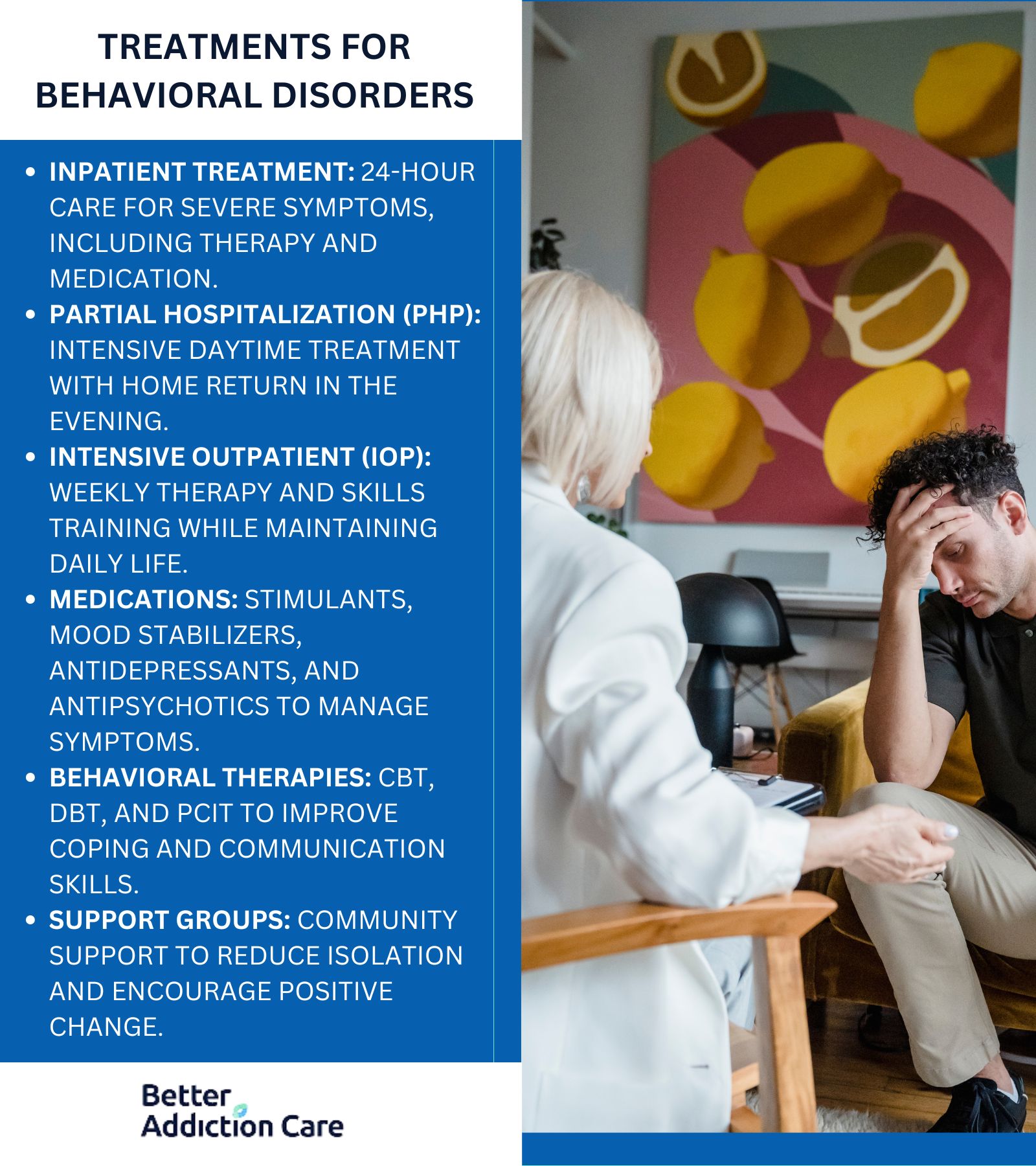
The treatments for behavioral disorders are detailed below:
Inpatient Treatment
Inpatient treatment provides 24-hour care in a structured residential setting for individuals experiencing severe behavioral symptoms that interfere with daily life. This level of care includes psychiatric evaluation, medication management, individual and group therapy, and crisis stabilization. Inpatient treatment is especially helpful for individuals who need intensive supervision and support to stabilize harmful behaviors and begin recovery.
Partial Hospitalization Program (PHP)
Partial Hospitalization Programs offer intensive, structured treatment during the day while allowing individuals to return home in the evenings. PHP typically includes daily therapy sessions, medication management, and psychiatric monitoring. This program is beneficial for individuals who require a higher level of care than outpatient therapy but do not need round-the-clock supervision.
Intensive Outpatient Program (IOP)
Intensive Outpatient Programs involve several hours of treatment per week, including individual therapy, group counseling, and life skills training. IOP allows participants to continue with daily responsibilities while receiving structured support. It is suitable for individuals transitioning from inpatient or PHP or those who need more than traditional outpatient care.
Medications
Medications used for behavioral disorders include stimulants, mood stabilizers, antidepressants, and antipsychotics. These medications help manage core symptoms such as impulsivity, aggression, mood swings, and attention difficulties. Medication is most effective when combined with therapy and regular psychiatric monitoring.
Some of the medication used for behavioral disorders include:
-
Methylphenidate: A stimulant used to improve focus and reduce impulsive behavior in individuals with ADHD.
-
Risperidone: An antipsychotic, prescribed to manage aggression, irritability, and mood swings in children with conduct-related disorders.
-
Aripiprazole: Another antipsychotic used to treat irritability and behavioral symptoms in individuals with autism or mood disorders.
-
Atomoxetine: A non-stimulant medication for ADHD that helps regulate attention and reduce hyperactivity.
-
Valproate: A mood stabilizer used to manage severe mood swings and aggression, especially in disorders like Intermittent Explosive Disorder (IED).
Behavioral Therapies
Behavioral therapies such as Cognitive Behavioral Therapy (CBT), Dialectical Behavior Therapy (DBT), and Parent-Child Interaction Therapy (PCIT) target negative behavior patterns and replace them with healthier responses. These therapies help individuals develop coping skills, emotional regulation, and improved communication.
Support Groups
Support groups provide a community of individuals with similar experiences, offering encouragement, accountability, and shared coping strategies. These groups, led by a trained facilitator, are effective in reducing isolation, building resilience, and reinforcing positive behavioral changes outside of clinical settings.
Where to Find Treatment for Behavioral Disorders Near Me?
To find treatment for behavioral disorders near you requires identifying local resources and facilities that cater to mental health needs. Online directories like Better Addiction Care assists in locating tailored programs in your vicinity. Check out the treatment locator to find tailored treatment for your specific disorder.
What Is the Average Cost of Behavioral Disorder Treatment?
The cost of treating behavioral disorders varies based on factors such as the type of therapy, treatment setting, provider qualifications, and geographic location. On average:
-
Outpatient Therapy: Sessions typically range from $100 to $200 per hour.
-
Inpatient Treatment: Daily costs range from $500 to $2,000, depending on the facility and services provided.
Factors influencing these costs include the duration of treatment, the severity of the disorder, and any additional services such as medication management or specialized therapies.
Does Insurance Cover Behavioral Disorder Treatment?
Yes, many insurance plans cover behavioral disorder treatment, but coverage specifics vary. The Mental Health Parity and Addiction Equity Act requires most insurance plans to offer mental health benefits comparable to medical and surgical benefits. However, coverage details, such as copayments, deductibles, and session limits, depend on your individual policy. It's essential to contact your insurance provider to understand the extent of coverage for behavioral disorder treatments.
How to Prevent Behavioral Disorders?
To prevent behavioral disorders involves early intervention and fostering environments that support mental health. According to research published in the Journal of Child Psychology and Psychiatry, early identification and intervention significantly reduce the development of behavioral disorders. Strategies include:
-
Promoting Positive Parenting Practices: Encourage consistent discipline, warmth, and involvement in children's lives.
-
Early Identification of Emotional Distress: Monitor and address signs of emotional or behavioral issues promptly.
-
Providing Social Skills Training: Teach children effective communication and problem-solving skills.
-
Ensuring Access to Mental Health Services: Facilitate availability of counseling and support services.
-
Reducing Exposure to Trauma and Violence: Create safe and supportive home and community environments.
What Is the Most Common Behavioral Disorder in Adolescents?
Attention-Deficit/Hyperactivity Disorder (ADHD) is the most common behavioral disorder among adolescents. The Journal of the American Academy of Child & Adolescent Psychiatry reports that ADHD affects approximately 5% of children and adolescents worldwide. ADHD is characterized by symptoms such as inattention, hyperactivity, and impulsivity, which impacts academic performance and social relationships.
Can a Child Outgrow a Behavioral Disorder?
No, children can experience a reduction in behavioral disorder symptoms as they mature, particularly with early intervention and appropriate treatment. However, without intervention, certain disorders will persist into adulthood. It's crucial to seek professional evaluation and support to address and manage these disorders effectively.
Can Behavioral Disorders Be Diagnosed in Adults?
Yes, behavioral disorders can be diagnosed in adults. While some disorders, like ADHD, are identified in childhood, they continue into adulthood and sometimes remain undiagnosed until later in life. According to the National Institute of Mental Health (NIMH), in 2022, approximately 23.1% of U.S. adults, equating to 59.3 million individuals, experienced a mental illness. Adults experiencing symptoms should consult a mental health professional for assessment and appropriate intervention.
Are Behavioral Disorders Linked to Learning Disabilities?
Yes, behavioral disorders are linked to learning disabilities. Research shows that children with learning challenges frequently develop behavioral issues due to frustration and repeated academic failure. A study published in JAMA Pediatrics indicates that from 1997 to 2021, approximately 8.83% of individuals aged 6 to 17 years were diagnosed with a learning disability, equating to about 9 in 100 children and adolescents. Likewise, behavioral disorders like ADHD or Conduct Disorder interfere with the ability to learn and perform well in school.
Are Behavioral Disorders Curable?
No, behavioral disorders are not curable in the traditional sense, but they are highly treatable. With consistent therapy, medication, support, and environmental changes, many individuals experience significant improvements in symptoms and quality of life. Long-term management is key to lasting success.
What Role Do Parents and Teachers Play in Managing Behavioral Disorders?
Parents and teachers are instrumental in managing behavioral disorders by providing consistent support and structured environments. Their roles include:
-
Implementing Behavioral Interventions: Utilizing strategies to reinforce positive behaviors and reduce negative ones.
-
Collaborating with Mental Health Professionals: Ensuring coordinated care and adherence to treatment plans.
-
Monitoring Progress: Observing and documenting behaviors to assess the effectiveness of interventions.
When Should I Seek Professional Help for a Behavioral Issue?
You should seek professional help for a behavioral issue if it is significantly affecting your life, mental and physical health. Professional help should be sought when behavioral issues:
-
Persist Over Time: Behaviors continue for several months without improvement.
-
Interfere with Daily Life: Impact academic performance, social interactions, or family dynamics.
-
Cause Significant Distress: Lead to emotional suffering for the individual or those around them.
Is a Behavioral Disorder the same as a Mental Illness?
No, a behavioral disorder is not the same as a mental illness, although the two are closely related. A behavioral disorder refers specifically to patterns of disruptive behaviors that interfere with daily functioning, such as aggression, defiance, or impulsivity. These disorders are typically diagnosed in childhood or adolescence and include conditions like Oppositional Defiant Disorder (ODD) and Conduct Disorder (CD).
Mental illness, on the other hand, is a broader term that encompasses a wide range of emotional, psychological, and cognitive conditions that affect how a person thinks, feels, and functions. Examples include depression, anxiety disorders, bipolar disorder, and schizophrenia.
While behavioral disorders are a type of mental health condition, not all mental illnesses are behavioral disorders. The key difference lies in the primary symptoms: behavioral disorders are defined by outward actions, whereas many mental illnesses involve internal experiences like mood or thought disturbances.
Related Articles
Treatment Centers in New Jersey








